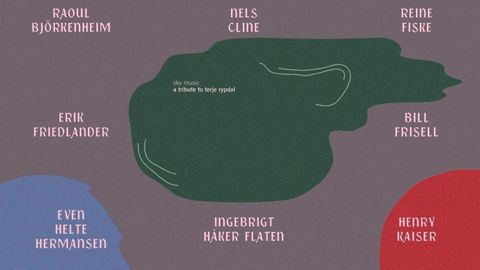Best known for his prog-orientated suite Kaleidoscope Of Rainbows, Neil Ardley’s On The Radio: _BBC Sessions 1971 _(Dusk Fire) contains previously unreleased recordings, with Ardley conducting the crème de la crème of the British jazz scene, including members of Colosseum, Nucleus and Greenslade. His luscious, brass-heavy orchestrations lend an insistent fire to a sequence of animated pieces that include Jack Bruce’s lilting, Mingus-style fantasia, The Immortal Ninth. As welcome as it all is, perhaps the real prize here is The Time Flowers. A superb 29-minute electro-acoustic suite with a string orchestra and Keith Winter’s synth, it originally accompanied a radio adaptation of a JG Ballad short story. Traversing a lyrical romanticism, unsettling scored tonalities and improvising jazzers, it’s a setting that reveals the scope of Ardley’s grander, eclectic ambition to great effect.
A stellar international cast that includes Hedvig Mollestad, David Torn, Jim O’Rourke, Motorpsycho’s Snah, Bill Frisell and others feature on Sky Music: A Tribute To Terje Rypdal (Rune Grammofon) They provide a scorching set whose passionate, emotional peaks frequently match those for which the Norwegian maestro of melancholia, now approaching his 70s, is rightly hailed. Startling arrangements of Rypdal’s tunes provide the canvas for vivid, saturated colours, nimble, expressive swirls, euphoric patterns and potent exchanges between the ensemble.
Another Norwegian guitarist, Stein Urheim, releases Utopian Tales (Hubro). It’s filled with sinuous, sometimes sensual tunes that trickle and shimmer through misty, windblown landscapes. The slow, lonesome peal of slide guitar adds a yearning dolorousness to the bubbling, kinetic vibe created by an ensemble that contains exotic synth, brass and woodwind; rolling, whip-cracking beats; and wispy vocals whose moods drift between trippy, electric Miles and the intuitive sparks of early Weather Report. A gorgeous soundtrack for the widescreen pictures in your mind.
French Canadian outfit Miriodor’s Signal 9 (Cuneiform) might loosely fit under the RIO banner, but there’s far more to them than that. The terse intricacies associated with that genre are present for sure, but at times their refracted, dissonant melodies and abrupt contrasts in time and instrumental texture sound like This Heat covering Captain Beefheart. Bracing and engrossing.
Orion Tango’s second album, The Apple Of No (1k Recordings) operates in the same quadrant of telepathicrock-based improvisation that King Crimson and Canexplored so expertly in the 70s. This is nobackward-looking knock-off though. TimMotzer’s elasticated guitar playing workswith a super tight, empathetic rhythm sectionthrough four full-on suites bristling withecstatic interplay. Their capacity to quicklysift through abstract layers to suddenlyhurtle into cathartic release over quick-firegrooves makes this album a thing of wonder.


